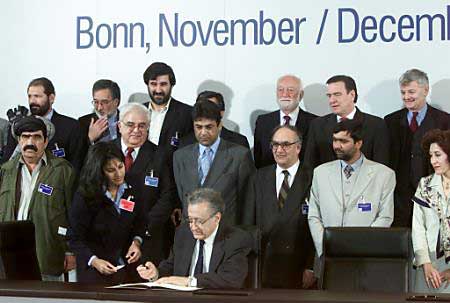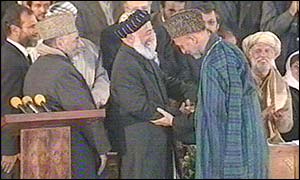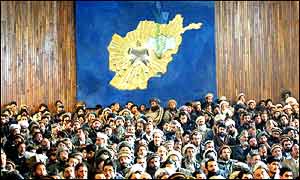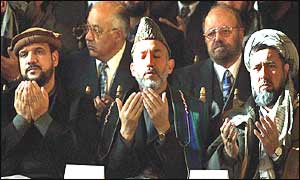
Bonn peace conference and agreements



Thursday December 6, 2001
This is the provisional list of the 30-member interim administration for Afghanistan which was approved on December 5 by four Afghan delegations meeting near Bonn, Germany. The portfolios are followed by the names, and where known, their ethnicity and delegation affiliation. There is a brief description of notable members of the new cabinet, which will convene in Kabul on December 22 and will probably be in power for six months before a constitution is drawn up and a new government formed.
"The Rome group" refers to the delegation of exiles loyal to former King Mohammad Zahir Shah.
Chairman/prime minister
Hamid Karzai: Rome group.
Mr Karzai is a highly regarded southern Pashtun leader, who enjoys a reputation as an independent-minded nationalist with a pro-western bent. An unusual figure in Afghanistan, he served in, yet was highly critical of, an earlier Northern Alliance government, and was wooed by the Taliban but scorned them. He has lived in America and was chosen by the US as the key figure to insert into Afghanistan to rally a Pashtun rebellion against the Taliban in the south.
Vice chairs Women's Affairs :Sima Samar
Defence :Mohammad Qassem Fahim
Planning :Muhammad Mohaqqeq
Water and Electricity :Shaker Kargar
Finance :Hedayat Amin Arsala
Members:
Foreign Affairs :Dr Abdullah Abdullah
Interior :Younous Qanooni
Commerce :Seyyed Mustafa Kazemi
Mines and Industries :Muhammad Alem Razm
Small Industries :Aref Noorzai
Information and Culture :Raheen Makhdoom
Communications :Abdul Rahim
Labour and Social Affairs :Mir Wais Sadeq
Hajj (Pilgrimage) :Mohammad Hanif Hanif Balkhi
Martyrs and Disabled :Abdullah Wardak
Education :Ghulam Muhammad: Yailaqi
Higher Education: Sharif Faez
Public Health :Suhaila Seddiqi
Public Works :Abdul Khaliq Fazal
Rural Development :Abdul Malik Anwar
Urban Development :Abdul Qadir
Reconstruction :Muhammad Amin Farhang
Transport :Sultan Hamid Sultan: Hazara
Return of Refugees :Enayatullah Nazeri
Agriculture :Seyyed Hussein Anwari
Irrigation :Mangal Hussein
Justice :Abdul Rahim Karimi
Air Transport and Tourism ;Abdul Rehman: Nuristani. Rome group.
First draft of UN-sponsored Afghan agreement
December 2 2001 20:49GMT
Agreement on provisional arrangements in Afghanistan pending the establishment of permanent government institutions. The participants in the UN Talks on Afghanistan
Determined to end the tragic conflict in Afghanistan and promote national reconciliation, lasting peace, stability and respect for human rights in the country. Reaffirming the independence, national sovereignty and territorial integrity of Afghanistan. Acknowledging the right of the people of Afghanistan to determine their own political future. Aware that the unstable situation in Afghanistan requires the implementation of emergency interim arrangements. Recognizing the need to ensure broad representation in these interim arrangements of all segments of the Afghan population, including groups that have not been adequately represented at the UN Talks on Afghanistan. Noting that these interim arrangements are intended as a first step toward the establishment of a broad-based, multi-ethnic and fully representative government and are not intended to remain in place beyond the specific period of time. Recognising that some time may be required for a new Afghan security force to be fully constituted and functional and that therefore other security provisions detailed in Annex I to this agreement must meanwhile be put in place. Considering that the United Nations, as the internationally recognized impartial institution, has a particularly important role to play, detailed in Annex II, in the period prio r to the establishment of permanent institutions in Afghanisatan.
Have agreed as follows:
The Interim Authority
I. General provisions.
1. The Interim Authority shall consist of an interim Administration presided over by a Chairman, a Special Independent Commission for the Convening of the Emergency Loya Jirga and a Supreme Court of Afghanisatan, as well as such other courts as may be established by the Interim Administration. The composition, functions and governing procedures for the Interim Administration and the Special Independent Commission are set forth in this agreement.
3. The Interim Authority shall be the repository of Afghan sovereignty, with immediate effect. As such, it shall, throughout the interim period, represent Afghanistan in its eventual relations and shall occupy the seat of Afghanistan at the United Nations and in its specialized agencies as well as in other international institutions and conferences.
4. An Emergency Loya Jirga shall be convened within six months of the establishment of the Interim Authority The Emergency Loya Jirga will be opened by His Majesty Mohammed Zaher, the former King of Afghanistan, who may preside over its first session. It shall decide on a Transitional Authority, including a broad-based transitional administration, to lead Afghanistan until such time as a fully representative government can be elected.
5. The Interim Authority shall cease to exist once the Transitional Authority has been established by the Emergency Loya Jirga. 6. A Constitutional Loya Jirga shall be convened within eighteen months of the establishment of the Transitional Authority, in order to adopt a new constitution for Afghanistan. In order to assist the Constitutional Loya Jirga prepare the proposed Constitution, the Transitional Administration shall, within two months of its commencement and with the assistance of the United Nations, establish a Constitutional Commission.
II. Legal framework and judicial system
1. The Constitution of 1963, to the extent that its provisions are not inconsistent with those contained in this agreement, shall apply on an interim basis until the adoption of the new Constitution referred to above.
2. The judicial power of Afghanistan shall be vested in a Supreme Court of Afghanistan, and such other courts as may be established by the Interim Administration. The Interim Administration shall establish, with the assistance and participation of the United Nations, a Judicial Commission to rebuild the domestic justice system in accordance with international standards, the rule of law and Afghan legal traditions. The judicial Commission may, inter alia, a. establish a system of recruitment for judges; b. Propose interim arrangements for civil, criminal and personal law; and c. Recommend and review existing laws and any legal framework to be established by the Interim Administration.
III Interim Administration
a. Composition
1. There shall be an Interim Administration composed of a Chairman, five Vice Chairmen and 23 other members.
2. The participants in the UN Talks on Afghanistan have invited His Majesty Mohammed Zaher, the former King of Afghanistan, to chair the Interim Administration. His Majesty has indicated that he would rather that a suitable candidate acceptable to the participants be selected as the Chairman of the Interim Administration.
3. The Vice Chairmen and other members of the Interim Administration shall be selected on the basis of professional competence and personal integrity from lists submitted by the participants in the UN Talks, with due regard to the ethnic, geographic and religious composition of Afghanistan and to th e importance of the participation of women. The candidates should possess the range of skills necessary for the proper running of various departments of the Interim Administration.
4. No person serving as a member of the Interim Administration may simultaneous, membership of the Special Independent Commission for the Convening of the Loya firga.
b. Procedures
1. The Chairman of the interim Administration, or in his absence one of the Vice Ch. shall call and chair meetings and propose the agenda for these meetings.
2. The Interim Administration shall endeavour to reach its decisions by the consensus if it becomes necessary, decisions shall be taken by a majority of the members prsent voting (unless otherwise stipulated in this agreement) provided that at least 19 members are in attendance. The Chairman shall cast the deciding vote in the event that the members are divided equally.
C. Functions
1. The Interim Administration shall be entrusted with the day-to-day conduct of the...of state, including the right to issue decrees for the peace, order and good government of Afghanistan.
2. The Chairman of the Interim Administration shall represent the Interim Administration appropriate, take the lead in defining the general lines of policy of the Administration, coordinate its work.
3. Those members responsible for the administration of individual departments shall be responsible for implementing the policies of the Interim Administration within their realm of responsibility.
4. As of the time of its establishment, the Interim Administration shall have full jurisdiction over the printing and delivery of the national currency and special drawing rights from international Financial institutions. The Interim Administration shall e stablish with assistance of the United Nations, a Central Bank of Afghanistan that will regulate the money supply of the country through transparent and accountable procedures.
5. The Interim Administration shall establish, with the assistance of the United Nations independent Civil Service Commission to provide the Interim Authority and the future Transitional Authority with shortlists of candidates for key posts in the administrative departments, as well as those of governors, uluswals and alqadars from which selection shall be made, in order to ensure their competence and integrity.
6. The Interim Administration shall, with the assistance and participation of the United Nations, establish a. a human rights commission, whose responsibilities will include: development of domestic human rights institutions; and b. A commission for refugees, displacement and repatriation, to facilitate the voluntary return and reintegration of refugees and displaced persons. The Interim Administration may, with the assistance participation of the United Nations, also establish any other commissions toreview matters not covered in this agreement.
7. The members of the Interim Administration shall abide by a Code of Conduct elaborated by the United Nations, based on codes of conduct in existence in other countries and taking into account the views expressed by the participants at the UN Talks on Afghanistan.
8. Failure by a member of the Interim Administration to abide by the provisions of the Code of Conduct shall lead to his/her suspension from that body. The decision to suspend a member shall be taken by a two-thirds majority of the membership of the Interim Administration on the proposal of its Chairman or any of its Vice Chairmen.
9. The functions and powers of members of the Interim Administration will be further elaborated, as appropriate, with the assistance of the United Nations.
IV The Special Independent Commission for the Convening of the Emergency Loya Jirga
1. A Special Independent Commission for the Convening of the Emergency Loya Jirga shall be established within one month of the establishment of the Interim Authority. The Special Independent Commission will consist of twenty-one members who have expertise in constitutional and customary law and who have helped prepare or participated in previous Loya Jirgas. The members will be selected from lists of candidates submitted by participants in the UN Talks on Afghanistan as well as Afghan professional and civil society groups. The United Nations will assist with the establishment and functioning of the commission and of a substantial secretariat.
2. The Special Independent Commission will have the final authority for determining the procedures for and the number of people who will participate in the Emergency Loya Jirga. The Special Independent Commission will draft rules and procedures specifying (i) the criteria for allocation of seats to the settled and nomadic population residing in the country; (ii) criteria for allocation of seats to the Afghan refugees living in iran, Pakistan, and elsewhere, and Afghans from diaspora; (iii) criteria for inclusion of civil society organizations and prominent individuals, including Islamic scholars, intellectuals and traders, both within the country and in the diaspora. The Special Independent Commission will ensure that due attention is paid to the inclusion of significant numbers of women and the inclusion of minority groups.
3. The Special Independent Commission will publish and disseminate the rules and procedures for convening of the Emergency Loya Firga at least ten weeks before it convenes, together with the date for its commencement and its suggested location and duration.
4. The Special Independent Commission will adopt and implement procedures for monitoring the process of nomination of the individuals to the Emergency Loya Firga to ensure that the process of indirect elections or selection is transparent and fair. In the event of violations of the agreed procedure, the Special Independent Commission will have the authority to reject a candidate. To pre-empt conflict over nominations, the Special Independent Commission will specify mechanisms for filing of the grievances and rules for arbitration of disputes.
5. The Emergency Loya Jirga will elect a Head of the State for the Transitional Administration and will approve proposals for the structure and key personnel of the Transitional Administration.
6. The Emergency Loya Firga may adopt a modified version of the Constitution of 1963 and procedures for the strengthening of the rule of law and the functioning of an independent judiciary.
V Final provisions
1. As of the entry into force of this agreement all Afghan armed forces and armed groups in the country shall come under the command and control of the Interim Authority, pending their dissolution and disarmament or their integration into the new Afghan security forces established with the assistance of the United Nations.
2. The Interim Authority and the Emergency Loya Jirga shall act in accordance with basic principles and provisions contain ed in international instruments on human rights and international humanitarian law to which Afghanistan is a party.
3. The Interim Authority and the Special Independent Commission for the Convening of the Emergency Loya Jirga will make a concerted effort to ensure the participation of women as well as ethnic and religious minorities in the Interim Administration and the Emergency Loya Jirga.
4. The Interim Authority shall not grant amnesty from prosecution to persons who have committed serious violations of international humanitarian law or crimes against humanity.
5. All actions taken by the Interim Authority shall be consistent with Security Council resolution 1378 (1 November 2001) and other relevant Security Council resolutions relating to Afghanistan.
6. Rules of procedure for the organs established under the interim Authority will be elaborated as appropriate with the assistance of the United Nations.
Annex I
International security Force
1. The participants in the UN Talks on Afghanistan recognise that the responsibility for providing security and law and order throughout the country resides with the Afghans themselves. To this end, they pledge their commitment to do all within their means and influence to ensure such security including for all United Nations and other personnel of international governmental and non-governmental organizations deployed in Afghanistan.
2. With this objective in mind, the participants request the assistance of the international community in helping the new Afghan authorities in the establishment and training of new Afghan security forces.
3. Conscious that some time may be required for the new Afghan security forces to be fully constituted and functioning, the participants in the UN Talks request the United Nations Security Council to consider authorizing the early deployment to Afghanistan of a United Nations mandated force. This force would provide security assist with the maintenance of law and order for Kabul and its surrounding areas. Such a force could, as appropriate, by progressively expanded to other urban centres and other areas.
4. The participants in the UN Talks pledge to withdraw all armed units from Kabul and other urban centres or other areas in which the UN mandated force is deployed, and requests its assistance in facilitating the voluntary disarmament of the former combatents. It would also be desirable if such a force was to assist in the rehabilitation of Afghanistan's infrastructure.
Annex II
Role of the United Nations during the interim period
1. The Special Representative of the Secretary-General will be responsible for all aspects of the United Nations work in Afghanistan.
2. The Special Representative shall monitor and assist in the implementation of all aspects of this agreement.
3. The United Nations shall advise the Interim Authority in establishing a politically neutral environment conducive to the holding of the Emergency Loya Jirga in free and fair conditions. The United Nations shall pay special attention to the conduct of those bodies and administrative departments which could directly influence the convening and outcome of the Emergency Loya Jirga.
4. The Special Representative of the Secretary General or his delegate may be invited to attend the meetings of the Interim Administration and the Special Independent Commission on the Convening of the Emergency Loya Jirga.
5. If for whatever reason the Interim Administration or the Special Independent Commission were actively prevented from meeting or unable to reach a decision on a matter related to the convening of the Emergency Loya Jirga, the Special Representative of the Secretary-General shall, taking into account the views expressed in the Interim Administration or in the Special Independent Commission, use his/her good offices with a view to facilitating a resolution to the impasse or a decision.
6. The United Nations shall have the right to investigate human rights violations and, where necessary, recommend corrective action. It will also be responsible for the development and implementation of a programme of human rights education to promote respect for and understanding of human rights.
Peacefull transfer of power
< img src="images/karzai-zaher.jpg" width="300" height="180" border="0" usemap="#karzai-zaher.jpg">



Hamid Karzai was sworn in as Afghanistan's interim leader on 22 december2001, is already a tribal elder and a veteran of an Afghan war and its bloody political battles.
Such experiences may explain why the 44-year-old Karzai, like a lot of Afghan men, looks much older than his years.
And in a country where the average life expectancy for men is just 46, the next six months are likely to bring more events that will speed the ageing process.
The royalist took his oath as chairman of a cabinet of a powerful mix of Afghanistan's rival factions that must get the country on its feet again after more than two decades of conflict, including five years of harsh Taliban rule.
The post is partly a reflection of his ability to tackle the tough political landscape and a reward for his backing of the US bombing campaign in his homeland.
As chairman, Karzai will lead a 30-member body for six months, before a "Loya Jirga" grand assembly of elders appoints an 18-month transitional government to organise elections.
To get the post, hammered out at tough negotiations in Bonn, he had to win the key endorsement of the powerful Northern Alliance.
But Karzai, whose main previous government responsibility was a brief stint as deputy foreign minister in 1992, has many of the credentials needed to satisfy the diverse demands of the Afghan factions.
As a close associate of ex-king Mohammed Zahir Shah, he can hope for royalist support. And his record as a fighter in the war against the 1979-89 Soviet occupation earns him the respect of former mujahedin fighters.
Little over a month ago, Karzai's main concern was to save his life as Taliban troops closed in on him.
Karzai slipped into Afghanistan in mid-October to foment an anti-Taliban revolt. Following a tip off, the Islamic militia raided his hideout in Uruzgan province.
Had he been caught, Karzai would no doubt have suffered the same fate as former mujahedin hero Abdul Haq who had been executed one week earlier while attempting the same mission.
Karzai escaped into Pakistan with help from American forces, according to US Defense Secretary Donald Rumsfeld -- a claim denied by Karzai's family.
His forces later teamed up with former Kandahar governor Gul Agha to force the Taliban to surrender their main stronghold of Kandahar on December 7, two days after the factions in Bonn agreed he should head the new government.
Karzai originally backed the Taliban when they appeared in 1994 but quickly became disillusioned with their ruthless tactics and the arrival of Saudi militant Osama bin Laden and his followers. Karzai has often expressed bitterness at the presence of "foreign terrorists" in Afghanistan.
He blamed the Taliban for the assassination of his father, Abdul Ahad Karzai, in the Pakistani city of Quetta in 1999.
The killing saw Karzai become head of the Popalzai clan, which has long wielded considerable influence in southern Afghanistan. Karzai's grandfather was a president of the national council which operated during the reign of Zahir Shah until the king's ousting in 1973.
Karzai, born in Kandahar, was educated in Kabul and went to university in Simla, India. His fluent English has further endeared him to western leaders.
However, wary of Afghanistan being unceremoniously abandoned by the west as it was in 1989 after the Soviet withdrawal, Karzai earlier this week warned the international community against repeating its mistakes. "The international community saw the consequences of neglecting Afghanistan. It should be wise enough not to do it again," he stressed.
It was a message he repeated in his inauguration speech Saturday, appealing for help from the United Nations and "other friendly countries" in reconstructing a country torn apart by more than two decades of war.
"Our country is in need of the support of the UN and friendly countries. We hope they will help us." Saturday December 22,2001.